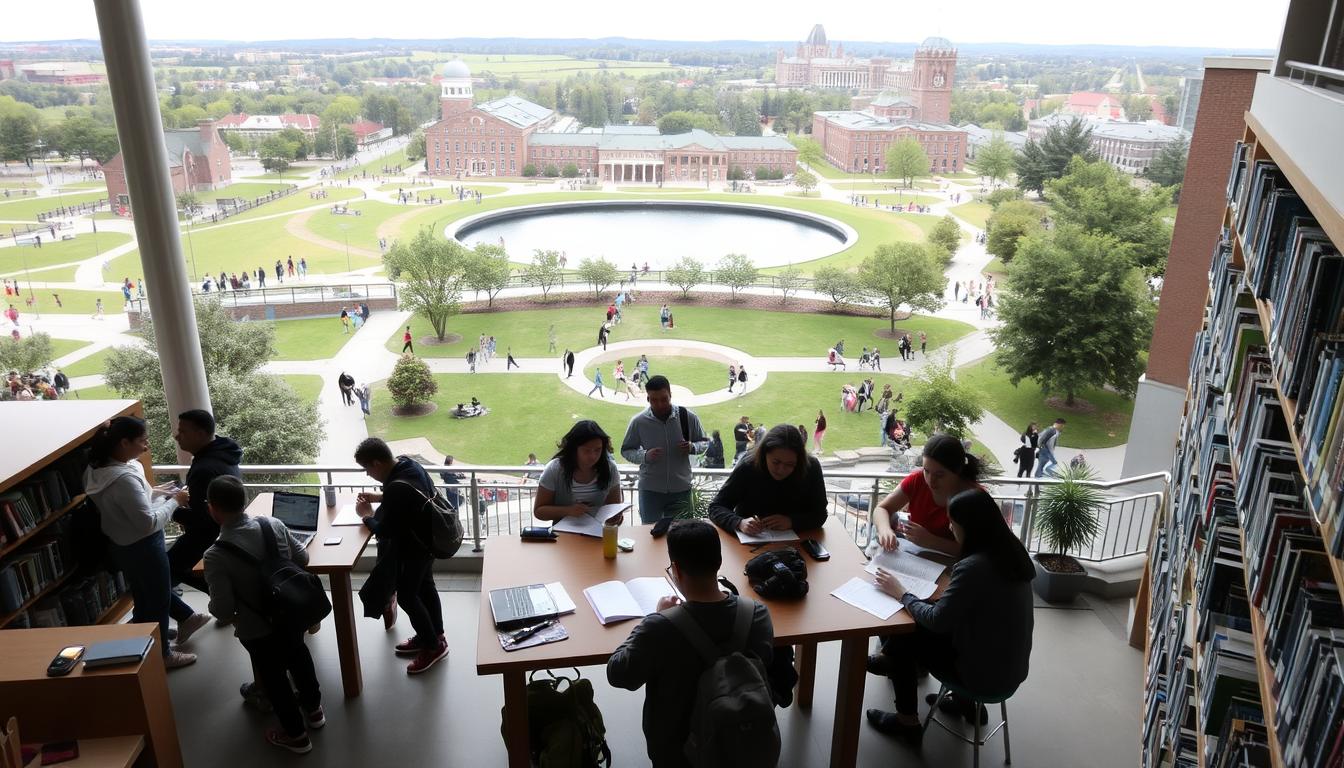Across the United States, 20 million students are in UNIVERSITY programs. This shows how important higher education is for the country’s future. Going to university is a journey of learning, growing, and exploring. It’s a key part of a person’s development.
At an academic institution, students find their passions, improve their skills, and make friends. These experiences help them achieve their dreams and make a difference in their fields.
The higher education scene in the U.S. is varied and lively. Many institutions offer different programs and chances for students. Universities have top-notch facilities and teachers to help students succeed.
Students get many chances to meet others, learn from teachers, and help the community. This builds a sense of belonging and connection that goes beyond school.
Introduction to University Life
At university, students learn about many subjects, join clubs, and grow personally. The UNIVERSITY life is meant to be all-encompassing and life-changing. It prepares students for their careers and more.
With a focus on academic institution and higher education, university life is vital for personal and professional growth.
Key Takeaways
- 20 million students are enrolled in UNIVERSITY programs across the United States
- The university experience offers a unique blend of academic rigor, personal growth, and social exploration
- Universities provide students with a platform to discover their passions, develop their skills, and forge lasting connections
- The higher education landscape in the United States is diverse and dynamic
- Universities are equipped to provide students with the tools and resources they need to succeed
- The university experience is designed to be a holistic and transformative journey
Understanding the Benefits of a University Education
Going to university offers many benefits that go beyond just learning. It helps students get better jobs and earn more money. Being part of campus life is also important, with lots of activities and resources to help students grow.
Some key benefits of university education include:
- Career advancement: A university degree can open up better job opportunities and higher pay.
- Networking opportunities: Universities are great for meeting people, including future employers and colleagues.
- Personal development: University life teaches students to be independent, responsible, and self-motivated.
Universities also offer many resources to help students succeed. These include academic advising, mentorship, career counseling, and internships. By using these resources, students can make the most of their time at university.
In summary, a university education gives students a solid base for their future careers. It also provides a network of connections and opportunities for life. Whether you want to enter a specific field or just improve your skills, university is a smart investment in your future.
| Benefits of a University Education | Description |
|---|---|
| Career Advancement | Enhanced job prospects and earning power |
| Networking Opportunities | Connections with peers, faculty, and professionals |
| Personal Development | Independence, responsibility, and self-motivation |
Types of Universities: Public vs. Private
Choosing between public and private universities is a big decision for students. Public universities are bigger and cheaper, with lower tuition and more programs. This can affect their ranking. Private universities, though, offer smaller classes and more personal attention, creating a strong community feel.
When it comes to university ranking, public schools usually rank higher because of their size and resources. But private schools offer specialized programs and better student support. Admission to public schools is simpler, while private schools are more competitive.
Here are some key differences between public and private universities:
- Tuition costs: Public universities are generally more affordable, with lower tuition costs.
- Class size: Private universities often have smaller class sizes, providing more personalized attention.
- Admission processes: Public universities have more straightforward admission requirements, while private universities have more competitive admission processes.
- Student resources: Private universities often provide more specialized programs and better student resources.
The choice between public and private universities depends on what a student needs. By looking at ranking, resources, and admission, students can choose wisely. This choice can help them succeed in their studies and career.
| University Type | Tuition Costs | Class Size | Admission Processes | Student Resources |
|---|---|---|---|---|
| Public | Lower | Larger | More straightforward | More extensive |
| Private | Higher | Smaller | More competitive | More specialized |
Choosing the Right University for Your Goals
Choosing a university is a big decision. Online learning has become popular, giving students flexibility. It’s important to research programs to see if they match your career goals.
The campus culture is also key. Students should think about campus size, location, and activities. Location matters too, like being close to home or having internship opportunities. This helps students find the right university for them, whether online or on campus.
Some important things to consider include:
- Academic programs and specializations
- Campus culture and extracurricular activities
- Location and accessibility
- Online learning options and resources
Finding the right university is vital for success. By looking into these factors, students can make a smart choice. This choice can lead to success in their field, whether online or on campus.
| University Type | Online Learning Options | Campus Culture |
|---|---|---|
| Public University | Yes | Diverse and inclusive |
| Private University | Limited | Small and specialized |
The Importance of Accreditation
Choosing the right academic institution is key. Accreditation is a must. It makes sure your university degree is valued everywhere. A good school will have accreditation from a trusted agency.
In the United States, there are two main types of accreditation. Regional accreditation is seen as more prestigious. It comes from agencies that check an institution’s programs, teachers, and resources.
What Is Accreditation?
Accreditation checks if a school meets quality standards. It looks at the school’s programs, teachers, and resources. This ensures they offer high-quality education.
Regional vs. National Accreditation
Regional accreditation is for schools that meet regional standards. National accreditation is for schools that meet national standards. The big difference is how much employers and schools respect them.

Here are some key differences between regional and national accreditation:
- Recognition: Regional accreditation is more respected than national accreditation.
- Standards: Regional accreditation has stricter standards than national accreditation.
- Eligibility: Regional accreditation goes to non-profit schools. National accreditation goes to for-profit schools.
Financial Aid and Scholarships
Going to university can be expensive. But, there are many ways to get help, like scholarships, grants, and loans. Knowing about these options and how to apply is key. A top university ranking often means better student resources.
There are several financial aid choices:
- Scholarships: These are competitive but can give a lot of money to students who are excellent or in need.
- Grants: These are often based on need and can come from the government or private groups.
- Student loans: These are easier to get but need to be managed carefully to avoid debt.
It’s important to learn about each financial aid type and how to apply. Universities offer student resources to help with this. These resources can be very helpful, helping students make the best choices for their financial aid.
Financing a university education needs careful planning. By understanding the different financial aid options and using student resources, students can reach their higher education dreams. This is true, no matter the university ranking.
The Role of Internships in University Life
Internships are key in university life. They offer students real-world experience and skills. These are important for their future careers.
By doing internships, students get practical experience. They also build their resume and professional network. This is vital for success in college and later.
Some main benefits of internships are:
- Gaining hands-on experience in a specific field or industry
- Building a professional network of contacts and mentors
- Developing skills and knowledge that can be applied in real-world settings
- Clarifying career goals and making informed decisions about future education and career paths
Internships also give a job market edge. Employers see internship experience as valuable. In higher education, internships are a key part of a college education.
Internships are vital in university life. They provide students with the skills, experience, and networking they need. By taking advantage of internships, students can succeed in their future careers and make the most of their higher education.
| Benefits of Internships | Description |
|---|---|
| Gaining hands-on experience | Applying theoretical knowledge in real-world settings |
| Building a professional network | Developing contacts and mentors in a specific field or industry |
| Developing skills and knowledge | Acquiring skills and knowledge that can be applied in future careers |
Online vs. Traditional University Programs
Students often debate between online learning and traditional university programs. Online learning is flexible, fitting well with work and personal life. Traditional programs, on the other hand, offer a hands-on learning experience with face-to-face interactions.
When deciding, consider these points:
- Flexibility: Online programs offer more scheduling flexibility.
- Cost: Online programs are often cheaper, with lower tuition and no need to move.
- Interaction: Traditional programs allow for more face-to-face time with teachers and classmates.
The choice between online and traditional programs depends on personal preferences and goals. By weighing these factors, students can pick the best option for them.
Online learning is great for those who need flexibility. But, if you prefer a more interactive setting, traditional programs might be better. Either way, getting a university degree is a rewarding step towards your career goals.
| Program Type | Flexibility | Cost | Interaction |
|---|---|---|---|
| Online | High | Lower | Limited |
| Traditional | Low | Higher | High |
Diversity and Inclusion Initiatives at Universities
Universities are key in promoting diversity and inclusion. This is vital for a lively campus life where all students can do well. By welcoming diverse views and experiences, universities make a place where everyone feels included and supported.
Universities have started programs to help with inclusion. These include cultural events, diversity workshops, and support services. These efforts help break down barriers and foster understanding and empathy among students. For instance:
- Cultural events that celebrate different backgrounds and traditions
- Diversity workshops that address issues of bias and discrimination
- Support services that provide resources and guidance for underrepresented groups
By focusing on diversity and inclusion, universities improve the student experience. This prepares graduates for a world that is more global and diverse. Students get to enjoy a campus life that values diversity and supports academic success.
In summary, diversity and inclusion are key for a positive academic institution. By promoting these values, universities create a vibrant campus life where all students can thrive and succeed.
| Initiative | Description |
|---|---|
| Cultural Events | Celebrate different backgrounds and traditions |
| Diversity Workshops | Address issues of bias and discrimination |
| Support Services | Provide resources and guidance for underrepresented groups |
Extracurricular Activities: A Vital Component
Extracurricular activities are key in university life. They offer students many chances to meet others, learn new skills, and follow their passions. These activities also show a university’s dedication to a well-rounded education.
By joining in, students can make their university time richer. They can also improve their resume and live a more balanced life.
Clubs and Organizations
Clubs and organizations let students meet others who share their interests. They are great for support, guidance, and personal growth. There are many types, from academic to cultural, helping students find their place and contribute to their community.
Sports and Recreation
Sports and recreation programs boost physical activity, teamwork, and healthy competition. They also show a university’s commitment to a full education. Students learn valuable skills like communication, problem-solving, and time management through these activities.
Volunteering Opportunities
Volunteering lets students help their community, grow empathy, and boost their career chances. It’s also a great way to gain real-world experience. By volunteering, students can positively impact their community and find purpose and fulfillment.
The Impact of University Rankings
University rankings play a big role when choosing where to study. They show how good a school is and help students compare options. It’s important to know what each ranking looks at, like how well students do or how much research is done.
Rankings can influence a student’s choice in many ways. A top-ranked school might look better for jobs later. But, a lower-ranked school might be great in other ways. It’s key to think about what matters most to you, not just the ranking.
- What courses and programs they offer
- The research opportunities and how much is done
- How happy students are and how many stay
- How well graduates do in their careers
By looking at these and understanding how rankings work, students can choose the best school for them.
In short, university rankings are important for students. Knowing how rankings are made helps students pick the right school. This choice should match their goals and what they value most.
| University Ranking Factors | Importance |
|---|---|
| Academic programs and courses offered | High |
| Research opportunities and output | Medium |
| Student satisfaction and retention rates | High |
| Graduate employment rates and career prospects | Medium |
Preparing for University Life
Starting college is a big step. It brings new challenges in academics and personal growth. Students need to be ready for coursework, clubs, and making friends. Learning to manage time and study well is key.
Time management is very important in college. It helps students balance school with other parts of college life. By planning and avoiding delays, they can do well. Good study habits, like reading actively and taking notes, also help a lot.
Orientations are also very helpful. They introduce new students to college life. Students learn about resources, what’s expected of them, and how to get help. This helps them feel part of the college community.
Some important tips for college include:
- Make a study plan and follow it
- Ask for help when you need it
- Join clubs to meet people and make connections
- Stay organized and manage your time well
By using these tips, students can do well in college. They’ll make the most of their time there.
The Transition from University to Workforce
After finishing university, graduates face a new challenge: entering the workforce. This step can be scary, but with the right plan, it can be done successfully. A university degree gives a strong base, and campus life prepares students for the real world.
Important things to think about during this time include:
- Creating a strong resume and online profile
- Connecting with professionals in your field
- Getting ready for interviews and tests
Using university resources like career counseling and job fairs can help a lot. These services help graduates find jobs and understand the job market. Being proactive and strategic can boost your chances of success and make a difference in your field.
The move from university to work takes patience, persistence, and hard work. Graduates need to keep learning and be open to feedback. With the right attitude and support, you can smoothly enter the workforce and reach your career goals.

The move from university to work is a key part of your career journey. By using what you learned in university and being active in your job search, you can set yourself up for success. This will help you achieve your long-term career goals.
| University Resource | Description |
|---|---|
| Career Counseling | One-on-one guidance to help graduates develop a career plan |
| Job Fairs | Events that connect graduates with possible employers |
| Alumni Network | A community of graduates who can offer support and advice |
Lifelong Learning and Continuing Education
Learning new things is a lifelong journey. Universities help a lot withcontinuing educationand growing professionally. Postgraduate programs like master’s and doctoral degrees offer deep training in specific areas. This helps graduates get better jobs and stay ahead in a fast-changing world.
Online learning platformsand courses make learning easy and flexible. They let people learn new things, explore interests, and follow their dreams. By always learning, people can stay flexible, creative, and successful in today’s complex world.
Starting higher education is just the beginning. Academic institutions keep providing resources for learning more. They help people improve their skills and open up new paths for growth. By always learning, people can achieve long-term success and help their communities and the world.
FAQ
What are the main benefits of a university education?
A university education boosts your career, helps you network, and grows your personal skills. It can open doors to better jobs and higher pay. You also get to meet new people and learn from experts.
Going to university teaches you to be independent and responsible. These skills are key for your future in work and life.
What are the key differences between public and private universities?
Public universities are bigger and cheaper, with more programs. Private ones offer smaller classes and a closer community, but cost more.
Choosing depends on what you value most: cost, size, or community.
How can students choose the right university for their goals?
Look at the programs, campus life, and location. Make sure the university fits your career dreams. Think about the campus vibe and where it’s located.
Consider how close it is to home and if it’s in a city or countryside. Also, check out internship chances.
What is the importance of accreditation for a university?
Accreditation means a university meets quality standards. It’s key for getting a degree that employers respect. Look for regional accreditation for the best recognition.
What types of financial aid and scholarships are available for university students?
Students can get scholarships, grants, and loans. Scholarships are competitive but can cover a lot of costs. Loans are more common but need careful handling.
How can internships benefit university students?
Internships give real-world experience and skills. They help build your resume and network. They also help you figure out your career path.
What are the pros and cons of online vs. traditional university programs?
Online programs are flexible and affordable. But, they need self-motivation. Traditional programs offer hands-on learning and community, but are more structured.
Choose based on your learning style and goals.
How do university rankings affect a student’s decision-making process?
Rankings show a university’s quality and reputation. They’re important but not the only factor. Consider what matters most to you when choosing a university.
How can students prepare for the transition from university to the workforce?
Start by building your network and resume. Practice for interviews. Use university resources like career counseling and job fairs.
These steps can help you find your first job.
What are the benefits of lifelong learning and continuing education?
Learning never stops, and universities support it. Postgraduate programs and online courses help you grow professionally. They keep you up-to-date in your field.
They also let you explore new interests and passions.








Leave a Reply